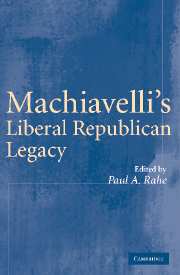Book contents
PART III - THE AMERICAN FOUNDING
Published online by Cambridge University Press: 24 July 2009
Summary
In at least one particular, the American Revolution bears comparison with the execution of Charles I and with Marlborough's great victory at the Battle of Blenheim. Like these two prior events, it occasioned a sea change in political thought by altering decisively the political world within which a particular group of exceptionally able men found themselves situated. As a consequence, it, too, marked an epoch in the reception of Machiavelli's republican ruminations.
Had it not been for the revolution, George Washington, Thomas Jefferson, and James Madison would not have had occasion to encounter John Adams and Alexander Hamilton. They would have eked out their lives in Virginia, playing the prominent role in local politics accorded the gentry of that colony, no doubt, but doing little if anything else of note. Adams and Hamilton would have suffered a similar fate. None of them would have been called upon to tackle the great questions that they confronted in the wake of 4 July 1776. Of this fact, they were acutely aware.
John Adams spoke for all of the individuals discussed in the chapters that follow when he celebrated the fact that his generation had “been sent into life at a time when the greatest lawgivers of antiquity would have wished to live” (WoJA 4:200). As the historian David Ramsay had occasion to observe firsthand while a member of the Continental Congress, the American Revolution made a difference in the lives of these men.
- Type
- Chapter
- Information
- Machiavelli's Liberal Republican Legacy , pp. 167 - 169Publisher: Cambridge University PressPrint publication year: 2005
- 1
- Cited by

